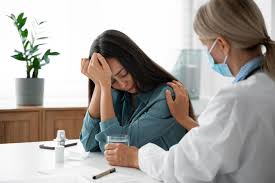It can impair a person’s ability to function in everyday life, leading to difficulties in relationships, work, and overall well-being. The good news is that depression is treatable. With the right combination of therapy, lifestyle changes, and, when necessary, medication, many individuals can manage their symptoms and reclaim their lives.
Understanding Depression
Depression is not just a fleeting feeling of sadness. It is a complex mental health condition influenced by various factors, including genetics, biology, environment, and life experiences. Symptoms can vary from person to person, but common signs include fatigue, sleep disturbances, changes in appetite, difficulty concentrating, and feelings of worthlessness. If left untreated, depression can last for weeks, months, or even years, significantly impacting quality of life.

Types of Depression Treatment
There is no one-size-fits-all treatment for depression. Each individual’s needs are unique, and the treatment plan must be tailored accordingly. Here are the most common treatment options available:
1. Therapy
Psychotherapy, also known as talk therapy, is one of the most effective treatments for depression. Cognitive Behavioral Therapy (CBT) is a widely used approach that focuses on identifying and changing negative thought patterns that contribute to depressive symptoms. By teaching individuals how to recognize and challenge these thoughts, CBT helps reduce the intensity and frequency of depressive episodes. Other forms of therapy, such as Interpersonal Therapy (IPT), which focuses on improving relationships, and Mindfulness-Based Cognitive Therapy (MBCT), which incorporates mindfulness techniques, can also be beneficial.
2. Medication
Antidepressant medications are often prescribed for moderate to severe depression, especially when therapy alone is insufficient. These medications work by affecting neurotransmitters in the brain, such as serotonin, norepinephrine, and dopamine, which play a key role in mood regulation. Selective serotonin reuptake inhibitors (SSRIs) like Prozac and Zoloft are commonly used and have fewer side effects than older antidepressants. It is important to note that finding the right medication can take time, as each person’s response to medication varies.
3. Lifestyle Changes
In addition to therapy and medication, making lifestyle changes can have a profound impact on managing depression. Regular exercise, for example, has been shown to boost mood by releasing endorphins, the body’s natural feel-good chemicals. A healthy diet, adequate sleep, and avoiding alcohol or substance abuse are also critical components of treatment. Social support, whether from family, friends, or support groups, plays a vital role in recovery, providing encouragement and reducing feelings of isolation.
4. Alternative Therapies
For some individuals, alternative therapies such as acupuncture, yoga, and meditation can complement traditional treatments. These practices help manage stress and improve emotional well-being. Light therapy, especially useful for those with seasonal affective disorder (SAD), involves exposure to bright light to regulate mood.
Seeking Help
If you or someone you know is struggling with depression, it is crucial to seek help. Early intervention often leads to better outcomes. A mental health professional can provide a comprehensive assessment and guide you through the most suitable treatment options.
Remember, depression is not a sign of weakness, and seeking help is the first step toward healing. With the right support and treatment, it is possible to manage depression and lead a fulfilling, joyful life.
Conclusion
Depression can be a debilitating condition, but it is treatable. A combination of therapy, medication, lifestyle adjustments, and support from loved ones can make a significant difference in recovery. By taking proactive steps and seeking the right help, individuals with depression can find a path to healing and regain control of their lives.
